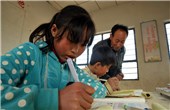Poverty and education connected
chinagate.cn by Zhang Ling, March 30, 2016 Adjust font size:
Importance of Knowledge
Li Jiheng, the Secretary of the Provincial Party Committee of Yunnan, revealed that education plays a vital role in poverty alleviation.
"Acquiring knowledge is regarded as a targeted measure to address the poverty issue,” said Li.
Xu Zongxiang, a pioneer of home-based farming from east China's Anhui Province, believes that agricultural techniques employed by farmers can reap huge profits. Taking his own efforts as an example, Xu enjoyed a fair harvest last year.
"Thanks to the agricultural techniques I have applied, the amount soybean output reached 317.5 kilograms per mu, doubling the average of our villagers. A technology building was also set up to foster more talents in my village," added Xu.
"Nowadays, information technology and precision techniques are increasingly used in agriculture. Combining the technological application of farming with theoretical knowledge is exactly what our farmers really need," stressed Xu.
Market-oriented vocational skills
"We just want to have a stable monthly income," said farmers in rural areas, expressing that developing problem-solving skills makes sense.
"Sometimes, those farmers don’t really understand high-tech farming theory. To them, the key is applying what they have learned to real social practice," told Xu.
Zhu Guojun, a deputy to the NPC from central China's Hunan Province, said that in addition to farmers, crafts people living in poverty could revive their practical skills to become rich. He emphasized that governments could favor education to infrastructure facilities, industrial-based support or direct economy aid.
Zhou Chaohong, a chief engineer from the Water Resources Research Institute of Tianjin, believes that providing knowledge is the best form of charity. Understanding through his first-hand experience, Zhou asserts that a lack of skills makes some people's lives worse. Most of the poor people living in Hebei and Tianjian become poor again despite relocation under the central government's financial support.
"Rural and urban education should be balanced, and the coordinated development of teaching resources is much needed," suggested Pang Lijuan, a professor at Beijing Normal University, adding that a shortage of teaching resources was one factor which leads to rural poverty.

